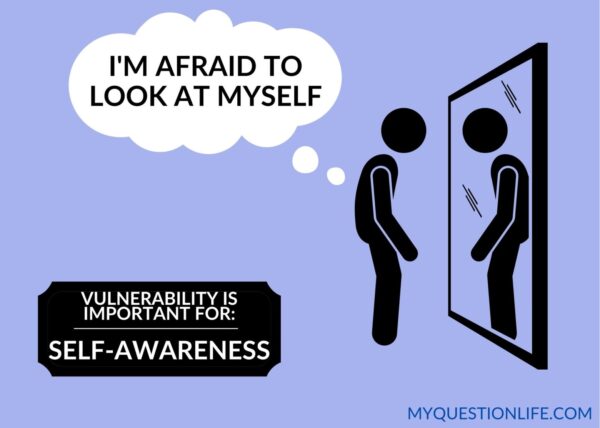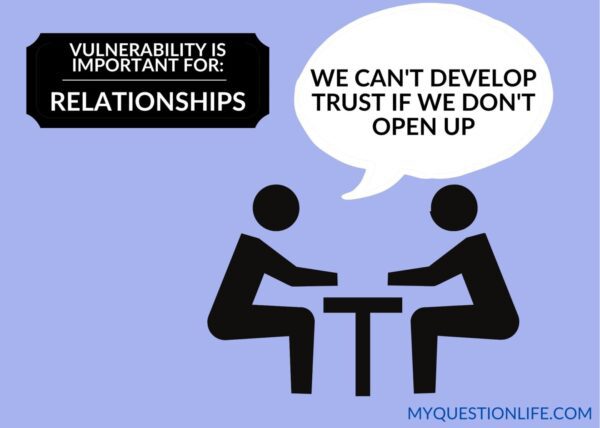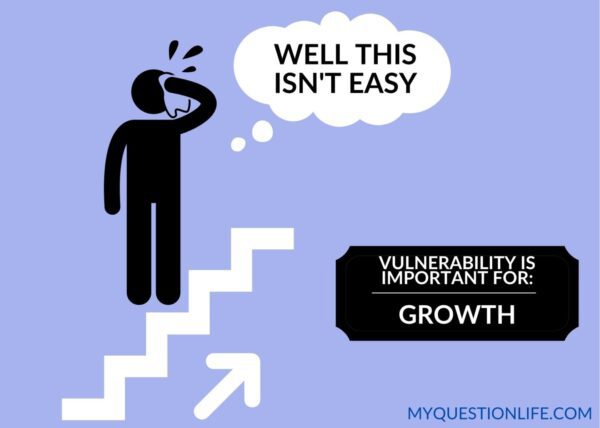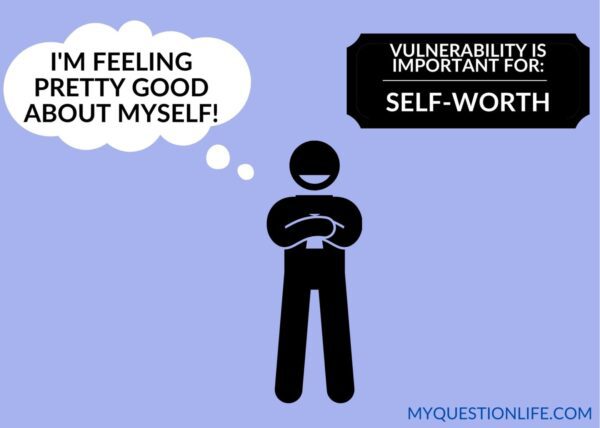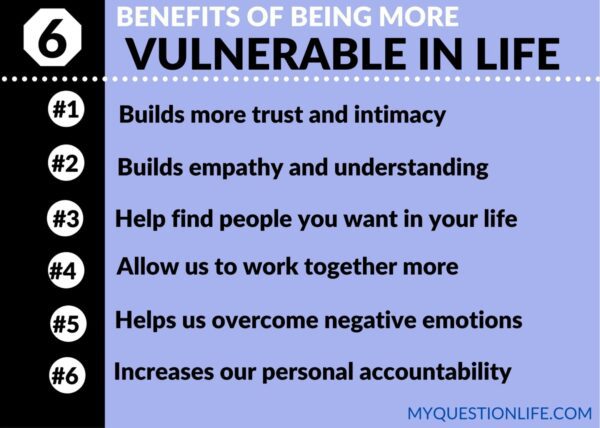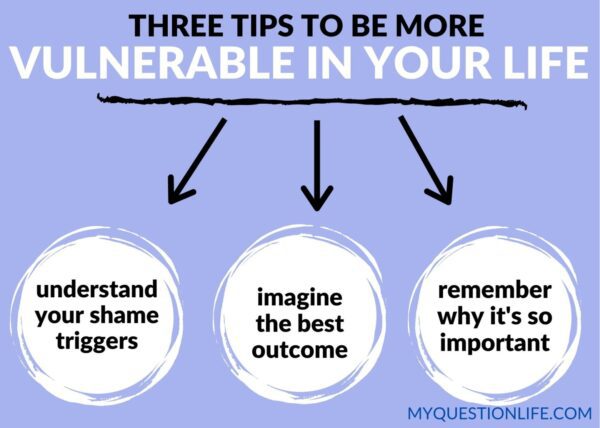Why is vulnerability important? Learn the benefits of being vulnerable.
My cousin and I are incredibly close. We shared our childhood, growing up a mile away from each other. When we left for college and then jobs, we managed to keep the connection strong. The other day, I asked her about this connection.
“How do you think our relationship has evolved over the years?”
She thought about it for a moment and then said, “I think the biggest turning point in our relationship was that one summer day, when we opened up to each other.”
I remembered the precise day. We were both home from college break, sitting in her bedroom. I summoned the courage to be completely vulnerable with her, revealing a shameful secret. She decided to be vulnerable as well, reciprocating with her own.
Up until that point, shame had held us back from showing our true selves. My cousin struggled with the potential of disappointing me. As the older cousin, I felt ashamed that I wasn’t the perfect role model for her. I still feel the urge to hide my flaws at times, but I remind myself that being vulnerable is important for our relationship.
Since that fateful day when we chose to be vulnerable, we’ve never looked back.
.
Vulnerability is Important Because Humans Need Connections
My relationship with my cousin is obviously a unique one. However, I have numerous other connections in my life that give me joy and meaning. I have family ties, friends, coworkers, students, a partner.
While these relationships take on very different forms, they all require one thing for true belonging: I need to be my authentic self.
Now, being my authentic self does not mean that I have to share all of my most shameful secrets. Vulnerability is not full disclosure. (If you want to learn other myths of vulnerability that may be holding you back, read 8 Myths About Vulnerability). Being vulnerable means showing up as my true self, in whatever capacity that might look like.
This notion, however, is much easier said than done. You see, humans are wired with a strong need for belonging. It’s rooted in our evolutionary genes for survival. So much so, in fact, that we actually suffer physically if we lack healthy relationships.
Because this need is so potent, we sometimes default to “fitting in” rather than true belonging. Maybe you laugh at a joke that you don’t actually find funny, or you agree to something even though you’re uncomfortable with it. Most commonly, you don’t express your feelings and desires because you’re afraid of being judged.
.
Vulnerability is not only important for relationships, but it’s necessary.
Brené Brown is the world’s leading researcher on shame and vulnerability. You might know her from her first viral TedTalk, The Power of Vulnerability. She’s also written multiple books on the topic (check out my recommendations for her books below – they quite literally changed my life).
Brené Brown has conducted thousands of interviews with people. When looking at all of her research, she found two things to be true:
- We need vulnerability to experience authentic connection
- Shame is the biggest culprit holding us back from being vulnerable
According to Brené Brown, “Vulnerability is not winning or losing; it’s having the courage to show up and be seen when we have no control over the outcome. Vulnerability is not weakness; it’s our greatest measure of courage.”
Want to read some more vulnerability quotes? Check out these 27 Inspiring Quotes on Vulnerability.
.
What does vulnerability look like?
My cousin and I were vulnerable when we said, “I did this thing I’m ashamed of.” Not only did I fear that she wouldn’t accept me, but I also worried that she would reflect my shame. At that moment, neither of us knew how the other person would react.
We had to summon a great deal of courage since we didn’t know the outcome.
These moments of uncertainty happen all the time, both big and small. Calling an old friend you haven’t talked to in years, unsure if they want to reconnect. Saying “I care about you” to someone who doesn’t usually express their emotions. Being brave enough to say, “This is what I want and need,” even if you’re afraid your viewpoint will be rejected.
In all these examples, you may feel a powerful fear of vulnerability. You’re not alone – our brains are wired to fill with these worries. Being vulnerable isn’t about erasing fear; it’s about having the courage to fight your fears. (Read more about our Fear of Vulnerability and How to Fight It).
If vulnerability comes with all this fear, shame, and uncertainty, why bother? Why be vulnerable in the first place?
Because you need vulnerability to live a meaningful life.
 .W
.W
Why is Vulnerability Important? The Importance of Being Vulnerable
Vulnerability is important for self-awareness.
If I could wave a magic wand and give everyone one strength, I would bestow self-awareness. Imagine if you understood your thoughts, feelings, and actions. Now imagine being able to manage these things in a way that allows you to create a meaningful life.
You can’t do this, however, without being vulnerable.
I have a friend who’s been single for a while. She says she wants to start dating but then comes up with a million reasons why now isn’t a good time. (“There aren’t any good options. Why start dating if I’m going to move soon. I don’t have time in my schedule to date.”)
I could argue against every point she makes, but it wouldn’t help. My friend’s an intelligent person. She knows – on some level – that these are just excuses. But it’s more comfortable for her to hold onto these excuses than to face the real things holding her back.
We often think of vulnerability in terms of our interactions with other people. But vulnerability is important for interacting with ourselves as well.
If my friend summons the courage to be vulnerable, she can ask the real questions: What am I afraid of? Why am I fighting against something I want? These questions are scary because she might not like the real answers. But until she can increase her self-awareness on this topic, she’ll never be able to get closer to what she wants.
Being self-aware not only helps you manage your emotions on a day-to-day level. It also lets you design your life in a way that will give you a sense of belonging and meaning. You can’t take these steps, however, until you’re willing to be vulnerable with yourself.
Read more about why Self-Awareness and Vulnerability are Necessary for Self-Growth. Also, you can take my free Self-Awareness Test or check out these 60 Hard Questions to Ask Yourself.
.
Vulnerability is important for relationships.
I’ve said this before, but the point warrants repeating. Vulnerability is necessary for healthy relationships.
I had a friend in college – let’s call her Debbie. Debbie seemed to be friends with everyone. Whenever we were together on campus, she would say hi to practically everyone. Nobody had a bad thing to say about Debbie. But the more I observed Debbie, the more I saw the truth. Debbie knew everyone, but she didn’t have a strong relationship with anyone.
I lived with Debbie for a year. I invited her to parties, asked her questions, and tried to put effort into a new friendship. Despite these efforts, I didn’t feel any closer to her and eventually gave up.
Now, I’m not saying Debbie needed to tell me everything or treat me like family. But some display of vulnerability would’ve helped us form a relationship. Without any vulnerability, we never built any trust. And without trust, we lacked the meaningful connection that comes from revealing our true self.
Whether it’s a college roommate, a family member, or a new romantic partner, the relationship will never get beyond the surface-level if each person isn’t willing to be vulnerable. True belonging comes from feeling accepted as your authentic self.
.
Vulnerability is important for growth.
Humans are pretty flawed, to say the least. (I know, even us perfectionists… I was surprised, too.) We’re working with outdated brain functions in an all-consuming, damaging culture. It’s not that we’re set up for failure – it’s that we’re set up with a lot of room for growth.
We need to be vulnerable if we want to achieve this self-growth, because we must face the hidden truth that everyone overlooks.
Sometimes I think that I can change things on my own. I think, If I just reflect and think my way through my issues, I can fix them! Not only does this rarely work, but it also assumes that I know what my problems are. Additionally, it keeps me in the Land of Control – a.k.a., I still feel like I have control over all my thoughts and problems. (Don’t worry, I’m not alone in the Land of Control. Quite a few of you like to hang out here as well).
Positive growth, though, doesn’t take place in the Land of Control. Instead, it comes from uncertainty, discomfort, and openness. I need to make myself vulnerable and open to change.
Furthermore, change is rarely inspired by our own thinking. More often than not, it comes from some sort of catalyst in our life. This catalyst might look like feedback from a friend, a new self-discovery question, or a session with a therapist.
Whatever the cause, we need vulnerability to be able to digest this catalyst for what it is: an opportunity to improve ourselves. Then we need to be vulnerable as we put in the effort to grow.
.
Vulnerability helps increase your self-worth.
When you summon the courage to be vulnerable, you probably don’t feel very confident. After all, you’re taking an emotional risk without knowing the outcome. The question, Will I be accepted or rejected? dominates the majority of your mind. It also might be followed by a slew of worst-case scenarios and shame-fueled regrets. (Learn How to Overcome your Vulnerability Hangover).
In these uncomfortable states, self-worth probably doesn’t seem like it’s on the table. (In fact, it probably feels like it’s locked in a drawer in the furthest room away.) So how on earth does vulnerability help increase your self-worth?
Here’s where we need to shift our mindset. Self-worth isn’t something we can place on the table; self-worth is more like the table itself. It’s the foundation for us to take these emotional risks and be vulnerable.
Remember, every time you learn how to be vulnerable, you create an opportunity. You will either be accepted or rejected. And the rejections will hurt. But without vulnerability, you’ll never allow yourself to be accepted.
Self-worth can only come from finding and showing your authentic self. You need to create the chance to feel accepted.
My friend spent much of his young adult life trying to please everyone around him. He called himself a “chameleon,” adapting to whatever group of people he was with. In many ways, this became a strength; he was well-liked and a friend to all. However, as time went on, he began to lose himself in his relationships. Rather than stand as his own person, his default became a mirror of what other people wanted him to be.
Naturally, he struggled to find his own sense of self-worth. How could he feel confident in himself if he never let his true self be seen?
It was when he learned how to be vulnerable, and express his own thoughts and desires, that he could begin to find confidence in his voice. The emotional risk wasn’t without fallout; some of his friendships faded away, his relationship had to adapt, etc. But ultimately, he carved a table for his true self to be supported with.
It’s hard to be vulnerable. Learning how to be vulnerable can take time. In the end, however, the benefits of being vulnerable far outweigh the potential risks.
Read more about why it’s hard to be vulnerable and what might be holding you back.
.
Why else is being vulnerable important?
Vulnerability is important for your self-awareness, relationships, growth, and self-worth. If you’re interested in reading more specific benefits of being vulnerable, check out the list below:
1. Vulnerability builds trust and intimacy in a relationship
Vulnerability and trust go hand in hand in a relationship. While it can be tricky to decide which comes first, both qualities build off of each other to deepen a connection. With a little trust, you can be more vulnerable. Then, with a bit of vulnerability, you can establish greater trust. This cycle is necessary to feel secure in your relationships. By being vulnerable, you give the person a chance to demonstrate their trustworthiness with your information. Generally, they will reciprocate the act, allowing you to prove your trust as well. Ultimately, this increased trust will encourage elevated intimacy between both parties.
2. Vulnerability builds empathy and understanding
One of the reasons being vulnerable is so scary is that we’re afraid of being judged. It can feel terrifying to reveal our inner emotions, whether they are fear, shame, or hope. By allowing ourselves to be seen, we allow others to put themselves in our shoes. Vulnerability builds empathy and understanding for everyone involved. The more open people are, the more we can understand the many different aspects of each person’s story. Sometimes even a reminder that everyone has their own story is enough to trigger our empathy. Empathy and understanding don’t only lead to stronger relationships; they are necessary to feel fulfilled in life.
3. Vulnerability helps us find the people we want in our lives
All humans need belonging, but often we mistake “fitting in” for belonging. When we try to fit in, we adapt to the given social situation instead of maintaining our authentic self. We do this because we are afraid of being rejected for who we are. Being vulnerable, while scary, is necessary to help you find the people who will accept you for your authentic self. Sure, it might feel super uncomfortable and disheartening if you reveal something to your “friends,” and they don’t support you. However, wouldn’t you rather know this truth than continue to spend time with people who don’t accept you? If you are vulnerable, you can find the people you want in your life: supportive, empathetic, and non-judgemental.
4. Vulnerability allows us to work together more
Our culture makes us think that we have to go at challenges alone. After all, we deceive ourselves into thinking that vulnerability is an unnecessary weakness. As a result, we foolishly try to solve our problems without the aid of others. Real vulnerability allows us to reach out for help and work together to overcome our challenges. It just makes sense, really. Wouldn’t you rather try to work through something, whether emotional or situational, with two or more minds on the case? Being vulnerable opens up a world of possibilities in terms of support and teamwork.
5. Vulnerability helps us overcome our negative emotions quicker
According to vulnerability research Brené Brown, “shame needs three things to grow exponentially in our lives: silence, secrecy, and judgment.” I would argue that this is true of most negative emotions. When we avoid vulnerability, we keep our negative emotions to ourselves. This amplifies them, and it prevents us from taking advantage of practical ways to process them. If, on the other hand, we allow ourselves to be vulnerable, we can foster a sense of community and support. We can work through our unpleasant emotions and develop coping strategies to overcome them.
6. Vulnerability increases our personal accountability
Sharing our emotions and mistakes with others can also help us improve our self-awareness and accountability. Through talking, we can identify our emotions, behaviors, and patterns. At times, this might feel difficult to do. The self-growth that comes from vulnerability will benefit us in the long run. Not only will we become more self-aware, but we will be able to take greater accountability for our actions. Our brain’s got a whole slew of biases trying to confuse us; on top of that, our emotions get in the way of our perspective. By being vulnerable, we can increase our personal accountability and make positive changes in our lives.
.
How to Be Vulnerable in Your Everyday Life
The greatest challenge to being more vulnerable is that we don’t know how to be vulnerable. We get caught up in cultural myths about vulnerability, skewing our perception of what genuine vulnerability looks like. It’s helpful to educate yourself on these misconceptions about vulnerability that are holding you back. The post will also give you questions and tips on how to be vulnerable in your life.
What you need to understand now is that vulnerability is not easy. It’s also not something that you can “get good at.” By its very definition, being vulnerable requires an emotional risk that will feel uncomfortable.
If you dare to be more vulnerable, however, it will drastically change your life. Below are a few helpful things to keep in mind as you embark on your vulnerability journey.
- Understand your shame triggers
If vulnerability is our protagonist, then shame is the villain fighting against it. For many reasons, shame is our most powerful motivating emotion. We avoid shame at all costs because it cuts deep into our sense of self-worth and belonging.
Often, this avoidance of shame keeps us from being vulnerable, even when we know it’s good for us. To combat this, we must understand our shame triggers and be more aware of where they are working against us.
Over the years, I’ve felt shame when I don’t meet our cultural expectations for being a “good female.” At times, this shame has held me back from being my most vulnerable self. The more I can understand where these shame triggers affect me, the more I can fight back against them.
- Imagine the best possible outcome
In our quest for control, any act of vulnerability leaves us feeling uncomfortable and uncertain. Naturally, then, our negativity bias and scarcity mindset fill our brains with worst-case scenarios.
Try to use your imagination for good rather than bad. While it will take a conscious effort to rewire your thinking, it can have a significant effect on your willingness to be vulnerable.
Let’s say you want to ask your boss for a raise. It’s probably easy to imagine every possible rejection: she laughs at you, tells you why you don’t deserve it, or fires you. But what are the potential good outcomes? What’s the best outcome? Hold onto these images in your mind.
- Remind yourself why vulnerability is important
You’ve got a lot of body and brain defenses fighting against you when it comes to vulnerability. Your evolutionary survival instincts are screaming, “Don’t do it! It’s not worth the risk! Run away from this now!” (Human biology is fun, amIright?)
What your body doesn’t realize is how important vulnerability is. That’s why you need to remind yourself of the benefits of being vulnerable. Whenever you feel fear rise up against you, push it back with logical reminders.
My natural tendency is to avoid close relationships as a means of protection. If a friend does something that makes me question our connection, I immediately feel an urge to cut them out of my life. However, I’ve learned that cutting everyone out of my life doesn’t lead to happiness. When I feel these tendencies fire up, I remind myself what being vulnerable will give me in the long run.


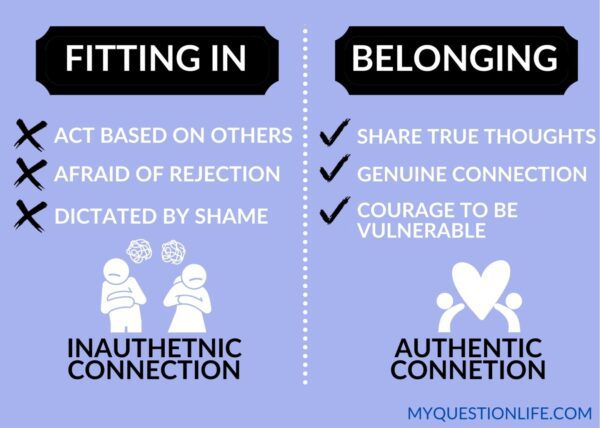
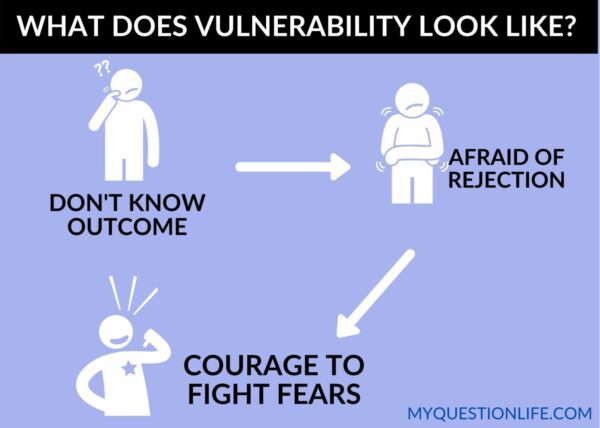
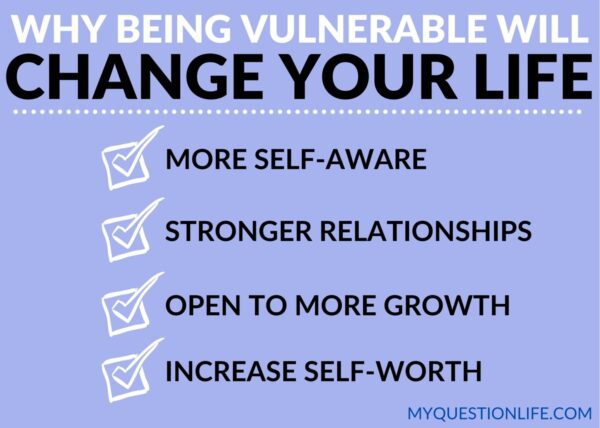 .W
.W